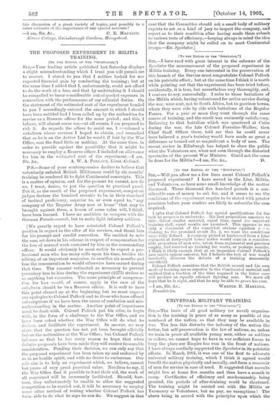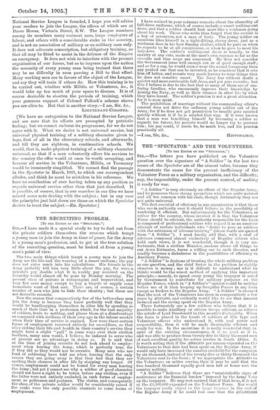[TO THE EDITOR OF THE " SPECTATOR:1
SIR,—The basis of all good military (or naval) organisa- tion is the training in peace of as many as possible of the manhood of the nation, so that they may be available in war. The less this disturbs the industry of the nation the better, but self-preservation is the law of nations, so, unless we train in peace all available young men, either as soldiers or sailors, we cannot hope to have in war sufficient forces to keep the place our Empire has won in the front of nations. I have always cordially supported the Spectator in its patriotic efforts. In March, 1901, it was one of the first to advocate universal military training, which I think it agreed would benefit the nation physically and morally, and form a reservoir of men for service in case of need. It suggested that recruits might live at home five months and then have a month in camp. Certificates of efficiency and marksmanship being granted, the periods of after-training could be shortened. The training might be carried out with the Militia or Yeomanry or Volunteers, but no pay, no exemptions ! The above being in accord with the principles upon which the
National Service League is founded, I hope you will advise your readers to join the League, the offices of which are at Deere House, Victoria Street, S.W. The League numbers among its members many eminent men, large employers of labour, and others with a considerable stake in the country, and is not an association of military Or ex-military men only. It does not advocate conscription, but obligatory training, so that all may be fitted to assist in the defence of the Empire on emergency. It does not wish to interfere with the present organisation of our forces, but so to impress upon the nation the necessity of every young man being trained that there may be no difficulty in soon passing a Bill to that effect. Many working men are in favour of the object of the League, and say they will train if others do. How this training is to be carried out, whether with Militia or Volunteers, &c., it would take up tot) much of your space to discuss. It is of course desirable to shorten the periods of training, which your generous support of Colonel Pollock's scheme shows you are alive to. But that is another story.—I am, Sir, &c., LIEUTENANT-COLONEL.
[We have no antagonism to the National Service League, and are sure that its efforts are prompted by patriotic feeling ; but we cannot endorse its programme, for we do not agree with it. What we desire is not universal service, but universal physical training of a military character given to boys, first of all in the elementary schools, and afterwards, and till they are eighteen, in continuation schools. We would, that is, make physical training of a military character universal, so that if a man voluntarily offers his services to the country the offer would at once be worth accepting, and because all service in the Volunteers, Militia, or Yeomanly would be immensely simplified. We cannot find the passage in the Spectator in March, 1901, to which our correspondent alludes, and think he must be mistaken in his reference. We have no recollection of ever having taken up any position as regards universal service other than that just described. It is possible, of course, that in our searches in our files we have missed some note dealing with the subject ; but in any case the principles just laid down are those on which the Spectator desires to treat the subject.—En. Spectator.]















































 Previous page
Previous page